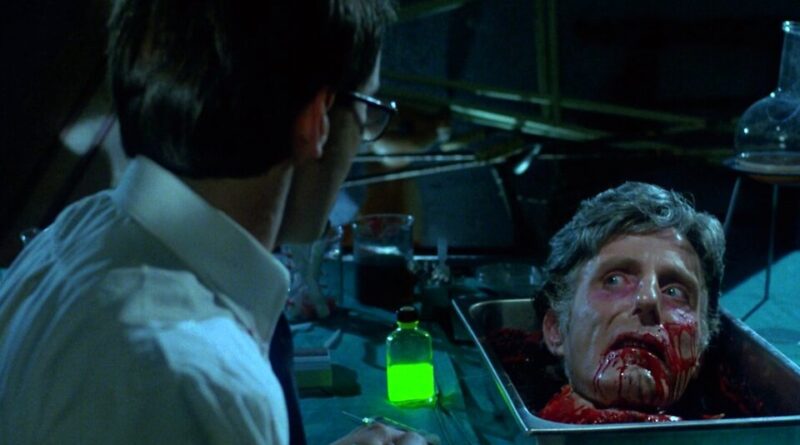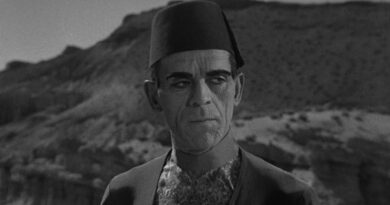H.P. Lovecraft’s Re-Animator (1985)
There’s a moment late in Re-Animator in which a length of intestine springs from the decapitated body of a zombie and wraps itself around Jeffrey Combs, forcing him to drop to the floor and writhe around as he tries to free himself. It looks like he’s being squeezed to death by a slimy pink python. This would be disgusting were it not so ridiculous. That’s sort of how the entire movie works; it not only accepts its innately preposterous premise but actively finds ways to have fun with it. There are scenes of gore and violence so over the top that they surpass indecency and become strangely and indescribably funny. The only exception is a scene where a severed head, which has been brought back to life, tries to rape Barbara Crampton, who lies bound and naked on a dissection slab. Here, the filmmakers might have gone one step too far. If there wasn’t a chance it would be misconstrued as a pun, I’d say that’s the point at which things come to a head.
The film has been adapted from H.P. Lovecraft’s short story “Herbert West – Reanimator,” which, according to the author himself, was intended to be a parody of Mary Shelley’s Frankenstein. Indeed, both stories concern themselves with the reanimation of the dead, along with the obvious implications. Alas, Lovecraft saw his story merely as a way to earn money and didn’t regard it very highly. This may account for its near total lack of scientific accuracy. What the makers of the film have done, rather cleverly, is use those phony elements to their advantage; if you flood the screen with images of blood and guts, and if you apply to them a macabre sense of humor, audiences won’t give a second thought (or perhaps a second severed head) to how implausible the plot is.
The film, which tells the story of a young mad scientist who has concocted a serum that can bring the dead back to life, is a miraculously successful balancing act between blood-soaked silliness and dramatic sincerity. When we’re not made to endure relentless gore effects, we’re bearing witness to surprisingly good performances. Among the best is Combs as Herbert West, a quiet, solitary, opportunistic man whose sole driving force is to prove his research as scientifically sound. There’s also Bruce Abbott as West’s reluctant assistant, med school student Dan Cain, who at the very least is not a brainless, horny teenager waiting his turn to be sliced open by a masked killer. There’s Crampton as Cain’s love interest Meg Halsey; although she does get naked and scream like a typical horror movie victim, she’s not a faceless bimbo, and her emotional range is convincing.
We step into slightly different territory with the villain, Dr. Carl Hill, who’s played by David Gale as a lecherous, loathsome typecast. This isn’t a criticism; Gale understands that all the best villains, especially in the horror movies of old, relied greatly on hambone performances. That’s what made them so much fun. Hill and West immediately become bitter rivals, and the former will eventually use his hypnotic powers – along, of course, with laser-induced lobotomies – to exert his control over his prey. This includes Meg, with whom he has become alarmingly obsessed. Hill will ultimately, and quite literally, lose his head. Under normal circumstances, this would mark his departure from the story. In this case, it marks the start of hilariously grotesque physical gags, the interplay between head and body as symbiotic as a vaudeville comedy team.
Pay close attention to the score, particularly if you’re a fan of Alfred Hitchcock’s Psycho. You should immediately pick up on composer Richard Band’s stylistic throwbacks to Bernard Herrmann, which are especially evident in the main title. I have a sneaking suspicion that this isn’t musical plagiarism but rather a loving homage. Herrmann’s all string score, which was made necessary due to a low budget, ended up becoming one of the film’s most iconic elements, especially during the now-famous shower scene. In Band’s case, there’s humor in the fact that he has adapted a blatantly psychological score for use in a film with zombies running amok. How he made it work, I have absolutely no idea.
I wonder the same thing about the film as a whole. Movies like Re-Animator are the cinematic equivalent of a burger and fries. My problem is that I enjoy junk food, probably more often than I should. (Warning: Despite my metaphorical reference to food, be sure to see this movie on an empty stomach.) Watching it was by no means a valuable or enlightening experience, but I’d be lying if I said that I didn’t have a great deal of fun. From the looks of things, I’d say the cast and crew had about as much fun as I did. Like the author who conceived of the original story, the filmmakers never took the idea seriously. Unlike the author, the filmmakers embraced its silliness and milked it for all it was worth. Or maybe bled it dry is a more fitting turn of phrase. Or completely gutted it. I’m never sure what to say when it comes to gory horror movies.




